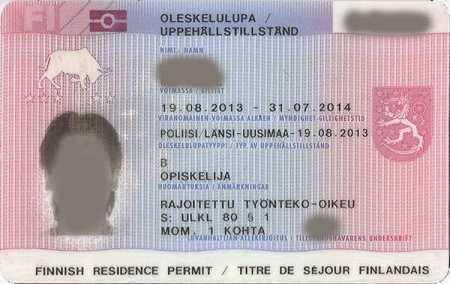Proposal for new residence permit act floated
Published : 13 Dec 2017, 03:02
Updated : 13 Dec 2017, 21:27
The interior ministry has circulated for comments a draft government proposal concerning the European Union directive on conditions of entry and residence of third-country nationals for the purposes of research, studies, training and voluntary services.
Residence permits for researchers and students would be extended and job-seeking and entrepreneurship would be encouraged through a residence permit granted for this, said an official press release.
To implement the directive, a new act would be passed, and regulations in the Aliens Act that overlap with the directive would be repealed.
In the future, all researchers would receive a researcher’s residence permit, irrespective of whether the research is in an employment relationship or, for example, receiving a grant.
The residence permit would be granted continuously for two years. Currently, a permit may be temporary or continuous and, in principle, is granted for one year.
All students would continue to be granted a temporary residence permit, but it would be granted for two years instead of one year. The EU directive concerns higher education students, but, for the sake of clarity, regulations applying to all students would be incorporated into the law. Permit conditions will remain largely unchanged, but tuition fees would now be included in the law as a condition of granting a permit, if the applicant is covered by a requirement to pay tuition fees.
At present, only graduates have the opportunity to receive a one-year job-seeking permit. Through the directive, both students and researchers may receive a residence permit for job-seeking and starting business activity, after they have completed their studies or research. This residence permit would also be granted for one year.
Students’ right to work for an average of 25 hours a week under the current Aliens Act will be transferred to the new act.
The new act would also provide for the conditions by which it would be possible to come to Finland to research and study under a residence permit granted by another EU member state.
A notification would be made to the Finnish Immigration Service, which would have 30 days to ascertain whether there were any security-related barriers, for example, to movement. A researcher or student utilising EU internal movement would have to fulfil the conditions set by Finland, including adequate means of subsistence.
The implementation of the EU directive applies only to training within an employment relationship, but all work-related training will be centralised in the new act.
The directive covers applicants who have completed a higher education qualification no more than two years previously, or who are participating in a study programme leading to a higher education qualification. A trainee must not replace a job.
The proposed regulations would apply only to voluntary service within the scope of the EU’s voluntary programmes, not any kind of voluntary work.
In addition, it has been proposed that the Aliens Act would also provide for a residence permit granted on the basis of an au pair placement.
The circulation for comment will end on 19 January 2018.


